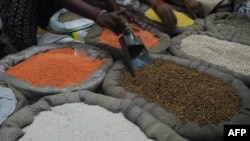NEW DELHI —
India’s finance minister said the country can afford a massive new government program to provide two-thirds of the country’s population with cheap food. It has been billed as the world’s biggest program to fight hunger, but there are fears it may further strain India’s weakening economy.
A day after the lower house of parliament approved a historic bill to provide heavily subsidized wheat and rice to nearly 800 million people, Finance Minister P. Chidambaram said the government has budgeted for the ambitious program.
The Food Security Bill was passed late Monday after an impassioned plea by the head of the ruling Congress Party, Sonia Gandhi.
Sonia Gandhi told legislators it is not a question of how we find means to implement the food bill, we have to find the way. She said it will transform the lives of tens of millions of people.
The bill will become law after it is approved by the upper house later this week.
It will dramatically expand an existing food subsidy program that covers about 200 million people. The government hopes it will wipe out hunger in a country where malnutrition is widespread. According to the United Nations, India is home to one quarter of the world’s hungry people.
But the main worries center around the program’s huge cost: an estimated $20 billion every year.
The central bank has already warned that increased public spending on implementing the food bill could deepen the government's deficit and stoke inflation.
Amid such concerns, stock markets plunged Tuesday and the already weakening rupee hit a new record low against the dollar.
That prompted assurances from Finance Minister Chidambaram, who said India can absorb the massive cost of the food security bill. He said the budget deficit will be controlled despite the added burden.
“We are now on a path of fiscal consolidation. We have some of the best advisers, best economic minds in the world. We will contain the current account deficit, so why doubt our capacity,” said Chidambaram.
Opposition parties have supported the food bill, but slammed it as a program meant to gather public support ahead of national elections next year. Murli Manohar Joshi is a senior leader of the main opposition Bharatiya Janata Party.
“This is an inadequate bill, this is a vote security bill, it does not mean anything about food security,” said Joshi.
Populist programs meant to attract voters are not new. In the run up to the last two general elections, the Congress Party passed a massive rural jobs plan and waived farm loans worth billions of dollars.
A day after the lower house of parliament approved a historic bill to provide heavily subsidized wheat and rice to nearly 800 million people, Finance Minister P. Chidambaram said the government has budgeted for the ambitious program.
The Food Security Bill was passed late Monday after an impassioned plea by the head of the ruling Congress Party, Sonia Gandhi.
Sonia Gandhi told legislators it is not a question of how we find means to implement the food bill, we have to find the way. She said it will transform the lives of tens of millions of people.
The bill will become law after it is approved by the upper house later this week.
It will dramatically expand an existing food subsidy program that covers about 200 million people. The government hopes it will wipe out hunger in a country where malnutrition is widespread. According to the United Nations, India is home to one quarter of the world’s hungry people.
But the main worries center around the program’s huge cost: an estimated $20 billion every year.
The central bank has already warned that increased public spending on implementing the food bill could deepen the government's deficit and stoke inflation.
Amid such concerns, stock markets plunged Tuesday and the already weakening rupee hit a new record low against the dollar.
That prompted assurances from Finance Minister Chidambaram, who said India can absorb the massive cost of the food security bill. He said the budget deficit will be controlled despite the added burden.
“We are now on a path of fiscal consolidation. We have some of the best advisers, best economic minds in the world. We will contain the current account deficit, so why doubt our capacity,” said Chidambaram.
Opposition parties have supported the food bill, but slammed it as a program meant to gather public support ahead of national elections next year. Murli Manohar Joshi is a senior leader of the main opposition Bharatiya Janata Party.
“This is an inadequate bill, this is a vote security bill, it does not mean anything about food security,” said Joshi.
Populist programs meant to attract voters are not new. In the run up to the last two general elections, the Congress Party passed a massive rural jobs plan and waived farm loans worth billions of dollars.




